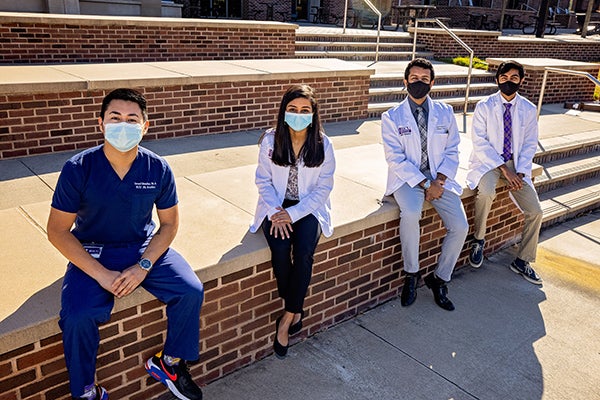ECU holds inaugural healthcare-centric interprofessional case competition
The ECU Health Sciences Leadership Council created a new healthcare-centric interprofessional case competition held on Oct. 31, bringing together teams of health professions students from across multiple schools and programs to develop and virtually present a proposed solution to a relevant issue in eastern North Carolina.
During the competition, teams of interprofessional students were asked to design an innovative and creative way to reduce the mortality rate related to heart disease in Perquimans County, particularly focusing on stoke. Teams were given an imaginary budget of $1,000,000 to create innovative ways to address community level interventions to reduce the mortality rate specifically related to stroke in that county over a 3-year period and present it virtually to a panel of judges.
This year’s focus was related to heart disease. According to the North Carolina Department of Health and Human Services, heart disease was the leading cause of death in 26 of the 29 eastern North Carolina counties in 2018. In Perquimans County, heart disease accounted for as much as 33.5% of all deaths.
“Ultimately, we created this competition to promote interdisciplinary collaboration and encourage students to get out of their silos and communicate to hypothetically solve a local health issue,” said Taylor Nelson, co-president of the Health Sciences Leadership Council. “We felt like this communication between students from varying programs was especially important during these times of social distancing. Working in an effective, real-life health care environment requires interprofessional partnerships, and this case competition provides a way for students to showcase their abilities to collaborate effectively in a virtual setting.”
Six teams competed this year and consisted of 28 students from 12 degree programs in six colleges and schools from across the Main and Health Sciences campuses. Students presented their solutions to a judging panel consisting of one faculty member from each college/school. A livestream of the presentations was provided.

Members of a winning team of ECU’s inaugural healthcare-centric interprofessional case competition. Left to right, Israel Mendez, Mona Amin, Atif Mahmood, and Arvind Rajan. Team member Grace Krell not pictured. (Photo by Cliff Hollis)
The winning team, “Stroke of Humanity” was awarded $1,300 in total prizes and will have their names added to a plaque in the Health Sciences Student Center.
Team members included Mona Amin (team captain) and Atif Mahmood from the Brody School of Medicine, Grace Krell from the College of Engineering and Technology, Arvind Rajan from the College of Health and Human Performance and Israel Mendez from the College of Allied Health Sciences.
Amin said she is thankful they were able to form a team, have weekly team meetings, gain a deeper understanding of Perquimans County and participate in this competition virtually over the short span of three weeks.
“We are so grateful that the HSLC Case Competition was able to bring us together and get us engaged in something outside of the classroom amidst everything we have had to adapt to during the pandemic,” she said. We also enjoyed watching all the livestreamed presentations after we presented. It was amazing to see such a great turn out for the inaugural launch of this competition.”
She also said she feels this competition will help prepare her team for the workforce.
“This competition helped our team utilize interprofessional skills to develop an innovative and sustainable community-based project, Amin said. “It taught us the importance of population health and taking the time to learn about patients before diving in to develop solutions and these are all skills that will be critical as we move forward as healthcare professionals in the future.”
ECU isn’t the only university participating in these competitions.
According to Emily Waters, assistant director of Graduate and Professional Student Engagement for the Division of Student Affairs, the Clarion Competition in Minnesota offers a national interprofessional case competition every year.
Waters said in the fall of 2019, Dr. Stephen Charles, assistant dean of academic affairs for the Brody School of Medicine, brought her the idea of sending a team of students to participate. The idea of competing was supported but there wasn’t a method for selecting students.
“UNC-Chapel Hill has a similar competition,” Waters said. “And after speaking with Dr. Meg Zomorodi from UNC-Chapel Hill, she encouraged us to create an ‘in-house’ competition with just students from ECU to build a base of participants and perhaps revisit the idea of sending the winning team of our ‘in-house’ competition to the Clarion Competition in future years.
“Our hope is to eventually build this into a state-wide competition where schools from across the state would first host their own competition and then each school would send their winners to participate in a state championship of sorts. That state champion could then go on and compete in Clarion.”